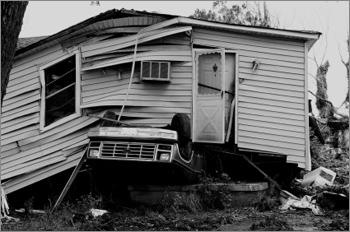The Limits to Ingenuity: Where Malthus May Have Had it Right
Marine biologists project the collapse of harvested seafood species by 2050. But do we need those species? The very question should generate ethical discomfort but also confront an economic truth: humanity might be able to innovate our way around the problem, at least from the perspective of food protein production. This raises a question for […]
Firefighting is a Subsidy
RFF’s Carolyn Kousky at the NYT’s Room for Debate on “Does the Government Cause or Prevent Wildfires?“: … federal fire suppression efforts can act as a subsidy for development, increasing the amount of land conversion in fire-prone areas. Communities have little incentive to restrain growth, but there may be high-risk areas where the costs of development to […]
NFIP Reform Passes

After years of discussion, Congress finally passed some important reform measures for the troubled National Flood Insurance Program (NFIP). The NFIP is a federal program that makes flood insurance available in participating communities. Today, there are over 5.5 million NFIP policies nationwide representing over $1.2 trillion in coverage. The NFIP is currently struggling under a […]
RFF Policy Commentary: How Generous Is Post-flood Disaster Aid?
Do people have unreasonable expectations about federal aid when disaster strikes? In the latest RFF Policy Commentary, RFF experts Carolyn Kousky and Leonard Shabman look at federal aid after flood events. They hypothesize that property owners may underinvest in insurance, incorrectly believing federal aid will cover their losses. This raises important questions about aid programs, flood insurance, and public […]
Cataloging Shale Gas Risks
Analyzing and evaluating environmental risks from shale gas development is difficult - not least because there seems to be little agreement about what those risks are. As part of a major RFF/Sloan Foundation research project, scholars with RFF’s Center for Energy Economics and Policy have attempted to address this gap with a new “risk matrix” […]
The Ins and Outs of the NFIP
If you want to get up to speed on the National Flood Insurance Program (NFIP), it’s hard to do better than RFF’s Carolyn Kousky. You can watch her giving CSPAN viewers the rundown on it here.
Is Oil Spill Liability Useless?
Pete argued yesterday that raising or eliminating statutory caps on oil spill damages wouldn’t increase safety - as he put it, “the incentive argument is overblown.” There’s some truth to this, but I don’t agree with his conclusion. This is probably no surprise: in 2010 I recommended that spill liability caps be increased significantly, up to […]
Adapting U.S. Flood Insurance Policy To Climate Change
In the wake of historic flooding in the Lower Mississippi River, the House Financial Services Committee approved a bill on Friday that would raise insurance rates from the National Flood Insurance Program (NFIP) to better reflect actual flooding risks, what some are saying is an important step to adapt the NFIP to the effects of […]
SEC Recognizes Climate Change as Material Business Risk
Last week the Securities and Exchange Commission took a significant leap into the climate change debate by clarifying the climate-related disclosure requirements for publicly traded firms. Investors and shareholder rights advocates have been calling for increased disclosure about the impact of climate change risks for several years—as evidenced by the emergence of the Carbon Disclosure […]
Dealing with Drought: Coordinating Freshwater Management to Adapt to Extreme Weather
More frequent and longer droughts coupled with increased hurricanes and floods could lead to a future of greater vulnerability for freshwater resources in the United States. Most current freshwater management policies were designed in the last 60 to 80 years, a period climatologists now recognize as unusually wet. But precipitation patterns in the coming decades […]

 Subscribe; to our RSS Feed
Subscribe; to our RSS Feed Tweets by @RFF_org
Tweets by @RFF_org 
Recent Comments